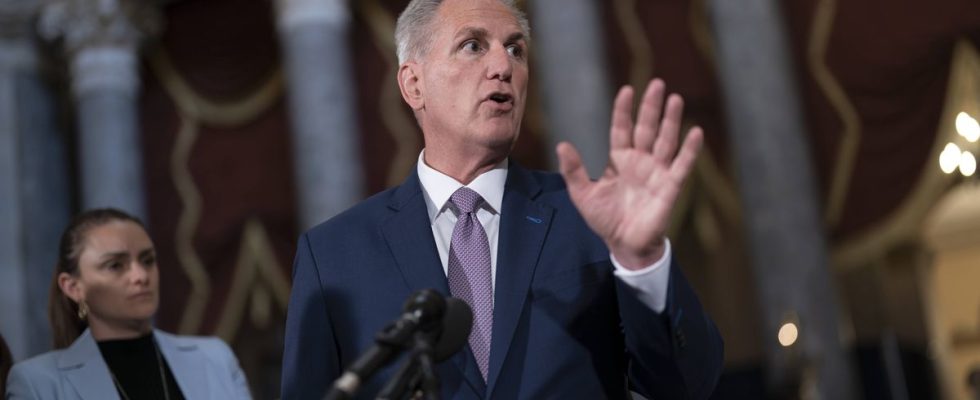The race against time to avoid a global “financial Armageddon” continues. House Republican boss Kevin McCarthy scored his first points on Wednesday, with the vote on his bill providing for an unprecedented cut in public spending in exchange for a hike in the debt ceiling.
His plan, which provides for a $4.5 trillion cut in federal spending over the next ten years in exchange for a $1.5 trillion increase in the public debt ceiling, currently at $31 trillion, was indeed adopted by the Republican majority in the House of Representatives.
For McCarthy, it was not won. The discussions continued between Tuesday and Wednesday in order to convince all the Republicans, as his room for maneuver is weak, because of the reduced majority he has. It was also a test for the “Speaker” of the House of Representatives, in order to prove his ability to bring together when necessary a party torn by centrifugal forces.
Biden refuses to negotiate
By achieving this, the Republican leader is mounting the pressure on Joe Biden, who launched his campaign for re-election in 2024 on Tuesday. “Our group voted for the only plan in Washington that tackles the debt ceiling, end excessive federal spending and put our country back on the path to sustainable growth,” McCarthy said in a statement.
“The president was very clear, this text has no chance of becoming law,” White House spokeswoman Karine Jean-Pierre immediately reacted with majority Democrats in the Senate. “President Biden will never force the middle classes and workers to bear the brunt of tax cuts for the wealthy, as this text provides.”
“I will be happy to meet with McCarthy but not on whether or not to raise the debt ceiling. It is non-negotiable, ”assured the American president, during a press conference at the White House, before knowing the outcome of the vote. The Democrats believe that the debt ceiling is not a negotiable subject, recalling that it does not concern new spending but those already voted in the past, from administrations from both parties.
The clock is ticking to avoid a default from June
For the United States, the stakes are high: never before has the country found itself in default on its debt and the latter serves as a safe haven for the global financial sector, due to the solidity of the guarantee. American. A default “would cause an economic and financial catastrophe”, again alerted Tuesday the American Secretary of the Treasury, Janet Yellen.
Unlike the majority of advanced economies, US debt is capped and its level must be voted on by Congress in order to keep up with its steady rise. A situation that has already occurred 78 times since the beginning of the 1960s, most often without difficulty.
Quickly finding a consensus is therefore a necessity for the United States, especially since the default could occur more quickly than initially expected. In a note published on Monday, Moody’s Analytics thus anticipates a risk of default “possibly at the beginning of June”, a risk which is starting to be taken into account by investors, as evidenced by the costs of insurance to cover themselves against a payment default. United States, the highest since 2011.
“Congress must vote to raise or suspend the debt ceiling. He must do so without conditions. And he must not wait until the last minute, ”hammered Janet Yellen on Tuesday.

